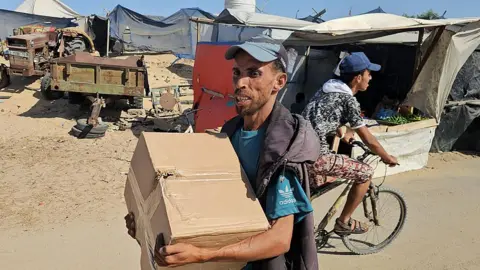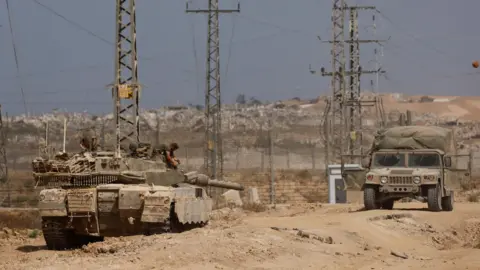Controversial US-backed group says it has begun aid distribution in Gaza
 AFP
AFPA controversial new aid distribution group backed by the US and Israel has begun working in Gaza.
The Gaza Humanitarian Foundation said lorry loads of food had been delivered to secure sites on Monday and that distribution had begun. Hundreds of Palestinians collected food parcels from a site in southern city of Rafah on Tuesday.
The GHF, which uses armed American security contractors, aims to bypass the UN as the main supplier of aid to the 2.1 million people in Gaza, where experts have warned of a looming famine after an 11-week Israeli blockade that was recently eased.
A UN spokesman said the operation was a "distraction from what is actually needed" and urged Israel to reopen all crossings.
The UN and many aid groups have refused to co-operate with GHF's plans, which they say contradict humanitarian principles and appear to "weaponise aid".
They have warned that the system will practically exclude those with mobility issues, force further displacement, expose thousands of people to harm, make aid conditional on political and military aims, and set an unacceptable precedent for aid delivery around the world.
Israel says an alternative to the current aid system is needed to stop Hamas stealing aid, which the group denies doing.
In a statement sent to journalists on Monday night, GHF announced that it had "commenced operations in Gaza" and delivered "truck loads of food to its Secure Distribution Sites, where distribution to the Gazan people began".
"More trucks with aid will be delivered [on Tuesday], with the flow of aid increasing each day," it added.
Handout photos showed three lorries laden with pallets of supplies at an unspecified location and just over a dozen men carrying away boxes.
The BBC has asked the GHF how many lorry loads of aid got in and how many people were able to pick up aid, but it has not yet received a response.
On Tuesday, the Israeli military said in a statement that two distribution sites located in the Tal al-Sultan neighbourhood of Rafah and the Morag Corridor, which separates the city from the rest of Gaza, had begun operating and distributing food to thousands of families.
Hundreds of Palestinians were seen queueing at the site in Tal al-Sultan, where food parcels were handed out by Palestinian workers.
"We stood in a long queue. We did not deal with the Israeli army or any American staff," one recipient told a local journalist.
A Palestinian working with one of the local companies involved in the operation told the BBC that "dozens of Palestinian workers from three Palestinian companies are overseeing the distribution process, which runs daily from 09:00 to 19:00".
The employee, who requested anonymity as he was not authorised to speak to the media, added: "The distribution is co-ordinated with five American security personnel, who are present on-site, but there are no Israelis involved in the process."
But many Palestinians stayed away from the sites.
A displaced woman from the neighbouring city of Khan Younis expressed concern about having to cross Israeli military lines to collect aid from the GHF's sites.
"We have no idea what awaits us there - whether we will return or be lost forever. We are being forced to risk our lives just to feed our children," she told BBC Arabic's Middle East Daily radio programme.
A man who was still living in Khan Younis despite an Israeli evacuation order said he would "refuse to accept American aid under these terms", and warned that it marked the beginning of a "broader strategy of displacement".
When asked to comment on the GHF's work by reporters in Geneva, a spokesman for the UN Office for the Co-ordination of Humanitarian Affairs (OCHA), Jens Laerke, said: "We do not participate in this modality for the reasons that we have given."
"It is a distraction from what is actually needed, which is the reopening of all the crossings into Gaza, a secure environment within Gaza, and faster facilitation of permissions and final approvals of all the emergency supplies that we have just outside the border," he added.
 Gaza Humanitarian Foundation/Handout via Reuters
Gaza Humanitarian Foundation/Handout via ReutersUnder the GHF's mechanism, Palestinians must collect boxes containing food and basic hygiene items for their families from four distribution sites in southern and central Gaza.
The sites will be secured by American contractors, with Israeli troops patrolling the perimeters. To access them, Palestinians were expected to have to undergo identity checks and screening for involvement with Hamas.
UN and other aid agencies have insisted they will not co-operate with any scheme that fails to respect fundamental humanitarian principles.
Jan Egeland, secretary general of the Norwegian Refugee Council and a former UN humanitarian chief, has described the GHF as "militarised, privatised, politicised".
"The people behind it are military - ex-CIA, ex-security people. There is a security firm that is going to work closely with one party to the armed conflict, the Israel Defense Forces," he told the BBC on Monday. "They will have some hubs... where people will be screened according to the needs of one side in this conflict - Israel."
"We cannot have a party to the conflict decide where, how and who will get the aid," he added.
On Sunday night, Jake Wood resigned as the GHF's executive director, saying the group's aid distribution system could not work in a way that would be able to fulfil the principles of "humanity, neutrality, impartiality, and independence".
The GHF's board rejected the criticism, accusing "those who benefit from the status quo" of being more focused on "tearing this apart than on getting aid in".
It said the system was fully consistent with humanitarian principles and would feed a million Palestinians - just under half the population - by the end of the week.
John Acree, a former senior manager at USAID - the US government agency responsible for administering foreign aid - has been named interim executive director.
Hamas has warned Palestinians not to co-operate with GHF's system, saying it would "replace order with chaos, enforce a policy of engineered starvation of Palestinian civilians, and use food as a weapon during wartime".
GHF's statement alleged that Hamas had also made "death threats targeting aid groups supporting humanitarian operations at GHF's Safe Distribution Sites, and efforts to block the Gazan people from accessing aid at the sites".
 Reuters
ReutersIsrael imposed a total blockade on humanitarian aid to Gaza on 2 March and resumed its military offensive two weeks later, ending a two-month ceasefire with Hamas.
It said the steps were meant to put pressure on the armed group to release the 58 hostages still held in Gaza, up to 23 of whom are believed to be alive.
On 19 May, the Israeli military launched an expanded offensive that Prime Minister Benjamin Netanyahu said would see troops "take control of all areas" of Gaza. The plan reportedly includes completely clearing the north of civilians and forcibly displacing them to the south.
Netanyahu also said Israel would temporarily ease the blockade and allow a "basic" amount of food into Gaza to prevent a famine, following pressure from allies in the US.
Since then, Israeli authorities say they have allowed at least 665 lorry loads of humanitarian aid, including flour, baby food and medical supplies, into Gaza.
However, the head of the UN's World Food Programme warned on Sunday that the aid was only a "drop in the bucket" of what was needed in the territory to reverse the catastrophic levels of hunger, amid significant shortages of basic foods and skyrocketing prices.
Half a million people face starvation in the coming months, according to an assessment by the UN-backed Integrated Food Security Phase Classification (IPC).
Israel launched a military campaign in Gaza in response Hamas' cross-border attack on 7 October 2023, in which about 1,200 people were killed and 251 others were taken hostage.
At least 54,056 people have been killed in Gaza since then, including 3,901 over the past 10 weeks, according to the territory's Hamas-run health ministry.
